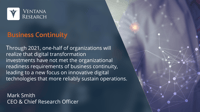The annual Ventana Research Digital Innovation Awards showcase advances in the productivity and potential of business applications, as well as technology that contributes significantly to the improved processes and performance of an organization. Our goal is to recognize technology and vendors that have introduced noteworthy digital innovations to advance business and IT.
Read More
Topics:
Sales,
Customer Experience,
Human Capital Management,
Marketing,
Office of Finance,
Voice of the Customer,
Continuous Planning,
embedded analytics,
Learning Management,
Analytics,
Business Intelligence,
Collaboration,
Data Governance,
Data Preparation,
Information Management,
Internet of Things,
Business Planning,
Contact Center,
Data,
Product Information Management,
Sales Performance Management,
Workforce Management,
Financial Performance Management,
Price and Revenue Management,
Digital Technology,
Digital Marketing,
Digital Commerce,
Operations & Supply Chain,
Enterprise Resource Planning,
ERP and Continuous Accounting,
Revenue,
blockchain,
natural language processing,
data lakes,
Total Compensation Management,
robotic finance,
Predictive Planning,
employee experience,
candidate engagement,
Conversational Computing,
Continuous Payroll,
collaborative computing,
mobile computing,
continuous supply chain,
Subscription Management,
agent management,
extended reality,
intelligent marketing,
sales enablement,
work experience management,
lease and tax accounting,
AI & Machine Learning,
robotic automation
I am happy to share insights gleaned from our latest Value Index research, an assessment of how well vendors’ offerings meet buyers’ requirements. The Ventana Research Value Index: Product Information Management 2021 is the distillation of a year of market and product research by Ventana Research. Drawing on our Benchmark Research, we apply a structured methodology built on evaluation categories that reflect the real-world criteria incorporated in a request for proposal to product information...
Read More
Topics:
Sales,
Marketing,
Product Information Management,
Price and Revenue Management,
Digital Commerce,
Operations & Supply Chain,
Enterprise Resource Planning
Augmented reality (AR) is a critical component of digital technology. The role of AR is to virtualize the visualization and engagement of assets and products with information that can enhance the value of it for many purposes including manufacturing, marketing, sales and service. Consider how manufacturing and field service organizations are starting to use AR technology for hands-free call-up of service manuals using glasses so technicians can verify progress without looking away from their...
Read More
Topics:
Sales,
Marketing,
Business Continuity,
Internet of Things,
Business Planning,
Digital Technology,
Digital Marketing,
Digital transformation,
mobile computing,
continuous supply chain,
extended reality
The annual Ventana Research Digital Innovation Awards showcases advances in the productivity and potential of business applications, as well as technology that contributes significantly to improved efficiency and productivity in the processes and the performance of an organization. Our goal is to recognize technology and vendors that have introduced noteworthy digital innovations that advance business and IT.
Read More
Topics:
Sales,
Marketing,
embedded analytics,
Analytics,
Sales Performance Management,
Digital Technology,
intelligent marketing,
sales enablement,
AI & Machine Learning
Economic dynamics and market pressures during a black-swan event can wreak havoc on efforts to effectively manage revenue operations and pricing for business continuity. For many organizations, environmental changes disrupt the methods by which these essential business processes are managed can be disrupted, damaging the revenue streams that create profitability. The array of pricing strategies and related promotional tactics across channels for configure, price and quote (CPQ), digital...
Read More
Topics:
Sales,
Customer Experience,
Human Capital Management,
Marketing,
Analytics,
Business Intelligence,
Collaboration,
Internet of Things,
Data,
Product Information Management,
Sales Performance Management,
Workforce Management,
Workforce Planning,
Price and Revenue Management,
Total Compensation Management,
Conversational Computing
Over the past several months, I have discussed a wide range of topics that organizations must consider and appropriately prioritize to maintain business continuity during periods of upheaval. But sometimes it’s important to take a step back and reflect on a critical and recurring theme: experiences. The array of experiences across the workforce and business processes both inside and outside of the organization are an essential part of an organization’s success. Leadership must give these...
Read More
Topics:
Sales,
Customer Experience,
Human Capital Management,
Marketing,
Office of Finance,
Analytics,
Business Intelligence,
Collaboration,
Internet of Things,
Data,
Sales Performance Management,
Workforce Management,
Workforce Planning,
Operations & Supply Chain,
Total Compensation Management,
Conversational Computing
Business planning is an essential part of an organization’s focus on its future performance and overall potential because it ensures continuous operations, even in black-swan events. Planning across the entire organization needs to be a critical priority and leadership should give it the attention it deserves. In challenging times, a focus on execution tends to take hold — this is not unreasonable but in focusing on satisfying immediate customer and workforce needs and putting out fires,...
Read More
Topics:
Sales,
Human Capital Management,
Office of Finance,
Continuous Planning,
Analytics,
Business Intelligence,
Collaboration,
Internet of Things,
Data,
Sales Performance Management,
Workforce Management,
Financial Performance Management,
Price and Revenue Management,
Operations & Supply Chain,
Enterprise Resource Planning,
ERP and Continuous Accounting,
Total Compensation Management,
Predictive Planning,
Conversational Computing
The workforce is an essential part of an organization’s overall business potential because it ensures continuous operations, even in black-swan events. The workforce is the core of the organization and should get the attention it deserves. In challenging times, a “customer-first” mentality tends to take hold — this is not unreasonable but in focusing on satisfying customers and opportunities, business leaders too often forget that the workforce experience is essential to achieving desired...
Read More
Topics:
Sales,
Customer Experience,
Human Capital Management,
Marketing,
Office of Finance,
Voice of the Customer,
Continuous Planning,
Business Continuity,
Analytics,
Business Planning,
Data,
Product Information Management,
Workforce Management,
Digital Technology,
Operations & Supply Chain,
Robotic Process Automation,
employee experience,
Conversational Computing,
collaborative computing,
agent management,
People Analytics
Marketing is inextricably linked to business success, and digital technology is essential to an organization’s overall marketing potential because it generates interest and brand awareness. In a black-swan event, the marketing department often is overwhelmed by short-term demands, so in these situations it’s of the essence that digital transformation gets the attention it deserves. In challenging times, a “putting-out-fires” mentality tends to take hold — this is not unreasonable but in...
Read More
Topics:
Sales,
Customer Experience,
Marketing,
Office of Finance,
Voice of the Customer,
Analytics,
Data,
Product Information Management,
Digital Technology,
Operations & Supply Chain,
Conversational Computing
Today’s businesses must manage a continually expanding array of data, content and digital assets as well as satisfy the demands of consumers for comprehensive product information. Addressing these challenges requires unified processes and automated systems and, most importantly, the ability to augment and enrich product information. Our earlier PIM research found that more than half (52%) of organizations have incompatible tools and almost half (48%) must cope with disparate forms of data....
Read More
Topics:
Sales,
Marketing,
PIM,
Digital Technology,
Operations & Supply Chain,
Intelligent CX,
product experience management,
PXM




















